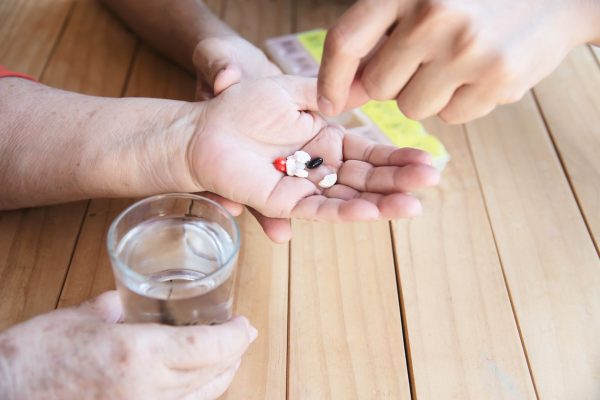Here’s a fact that just about knocked my socks off. Nearly 1 in 2 adults in the U.S. are living with high blood pressure. That’s about 116 million people!
With numbers like that, it’s no surprise that blood pressure medications are handed out like candy. And while these drugs can be life-saving in the short term… they can turn against you in the long run. Plus, we often forget that the stronger a drug is, the more side effects will come with it.
And, sadly, if you’re taking 3 or more meds at the same time, drug interactions can increase the number of side effects that you experience.
Even worse, some of the most commonly prescribed blood pressure meds may be doing more harm than good — especially to your kidneys.
Let me break it down.
🚫 How These Medication Can Turn Against You
Beta Blockers like atenolol and metoprolol can:
- Lower HDL (“good” cholesterol)
- Raise triglycerides
- Disrupt blood sugar control
All of which can increase your risk of heart disease — the very thing these meds are supposed to prevent!
Diuretics flush out excess fluid to lower blood pressure, but they also:
- Strip away magnesium and potassium (critical for heart health)
- Disrupt cholesterol and triglyceride levels
These events weaken your heart over time.
ACE inhibitors and ARBs, often used to protect the kidneys, can cause a decline in kidney function, especially in individuals with pre-existing kidney issues. They actually mimic the very damage caused by uncontrolled high blood pressure.
The result? A higher risk of kidney disease and, eventually, kidney failure.
💡 Why High Blood Pressure Hurts Your Kidneys
Your kidneys regulate blood pressure using an enzyme called renin. But when blood pressure remains high for too long, the kidney’s blood vessels stiffen, narrow, and lose their ability to filter waste and fluids.
That build-up raises your blood pressure even more — and the cycle repeats.
Ironically, the very drugs meant to stop this may also contribute to the damage when taken long-term.
✅ Natural Ways to Lower Blood Pressure (and Support Kidney Health)
The great news? Even if you’re already on anti-hypertension medications, you can work with your doctor to get off of them with the right changes. Here’s how:
1. Follow a Plant-Forward Diet
Try the DASH diet, which emphasizes fresh produce, whole grains, lean protein, and low sodium. Potassium-rich foods (like bananas, spinach, beans, and sweet potatoes) are especially helpful
2. Move Your Body
It improves blood flow, heart strength, and kidney function — and helps shed excess pounds. The more active you are, the more it will encourage blood flow. Your blood pressure will drop, your heart will pump more efficiently and your kidneys will function better. You’ll also start dropping excess pounds. Aim for at least 30 minutes of moderate exercise most days.
3. Address the Stress
Deep breathing exercises, meditation and getting a good night’s sleep are three things you can immediately start doing to help reduce your stress levels. I’ve seen many patients get great results with mind-body programs like yoga, tai chi or qi gong. Acupuncture and massage therapy are also great stress relievers.
4. Drink Beet Juice
Just 250 ml daily of beetroot juice can drop blood pressure by 8/4 mmHg, reduce arterial stiffness, and enhance kidney-supportive nitric oxide levels. I recommend taking beet juice the way an 87-year patient of mine did when he successfully used it for hypertension. He called his concoction “blood” and, to this day, I follow his recipe. His secret was juicing the beets, then adding lemon juice, unfiltered apple juice and a bit of ginger. (Or you can always look for a nitric oxide enhancing supplement that has beetroot as a main ingredient.)
5. Lose Excess Weight
Even modest weight loss can significantly improve your blood pressure and reduce your risk of kidney issues.
✨ Real-Life Inspiration
One of our readers recently told us about her father, who had dangerously high blood pressure. After just a short time on the DASH diet, his numbers improved dramatically.
One day. One change. Huge impact.
SOURCES:
Sarafidis PA, Bakris GL. Do the metabolic effects of beta blockers make them leading or supporting antihypertensive agents in the treatment of hypertension? J Clin Hypertens (Greenwich). 2006 May;8(5):351-6; quiz 357-8.
Ryan MP. Magnesium and potassium-sparing diuretics. Magnesium. 1986;5(5-6):282-92.
Akhtar F, Khalid F, Wang H, Zhang D, Gong X. The Effect of Thiazide Diuretics on Blood Lipid Profile in Hypertensive Adults: A Meta-analysis of Randomized Controlled Trials. Cureus. 2018;10(5):e2651.
Watanabe H, Martini AG, Brown EA, Liang X, Medrano S, Goto S, Narita I, Arend LJ, Sequeira-Lopez MLS, Gomez RA. Inhibition of the renin-angiotensin system causes concentric hypertrophy of renal arterioles in mice and humans. JCI Insight. 2021 Dec 22;6(24):e154337.
Kapil V, Khambata RS, Robertson A, Caulfield MJ, Ahluwalia A. Dietary nitrate provides sustained blood pressure lowering in hypertensive patients: a randomized, phase 2, double-blind, placebo-controlled study. Hypertension. 2015 Feb;65(2):320-7.
Mount PF, Power DA. Nitric oxide in the kidney: functions and regulation of synthesis. Acta Physiol (Oxf). 2006 Aug;187(4):433-46.



